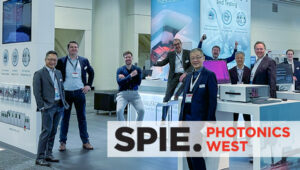April 2024
Business/Corporate – OFC 2024 sets stage for scaling next-generation integrated photonics manufacturing
OFC 2024 celebrates unprecedented visitor and exhibitor numbers and spotlights a thriving and rapidly evolving optical communications and networking industry following a year of intensive AI development
![]() At a very well visited and highly inspiring technology showcase display, OFC 2024 has again solidified the OFC conference’s status as the premier global event for optical networking and communications. With exhibitor numbers up almost a quarter year-on-year and some 12,500 international registered visitors, the most significant focus topics included 800ZR, Coherent PON, Linear Pluggable Optics (LPO), multicore fiber, artificial intelligence (AI), data center technology and quantum networking.
At a very well visited and highly inspiring technology showcase display, OFC 2024 has again solidified the OFC conference’s status as the premier global event for optical networking and communications. With exhibitor numbers up almost a quarter year-on-year and some 12,500 international registered visitors, the most significant focus topics included 800ZR, Coherent PON, Linear Pluggable Optics (LPO), multicore fiber, artificial intelligence (AI), data center technology and quantum networking.
Optical interconnects based on the utilization of integrated photonics and the associated PIC devices (e.g. in the form of co-packaged optics (CPO) for pluggables) already represent a vital technology cornerstone – a technology approach for which ficonTEC already has active production systems in the field. However, as a direct consequence of a marketplace now propelled by large-scale generative AI network demand, the role of integrated photonics is now undergoing a pivotal change in priority – that is, the surge in interest for the various components that make up data center architecture is also accompanied by an acceleration in the pace of hardware updates.
One significant task in catering to this demand will be the scaling of integrated photonics technologies and so too their high-volume manufacturing. This is perhaps currently an underestimated challenge and one that will require close co-operation among multiple partners in the industry to enable the cost-effective manufacturing of materials, components, modules and subsystems for future optical communications.
To showcase the benefits resulting from direct collaboration within the ecosystem, ficonTEC hosted live demos on its booth at OFC 2024. In one example, real-world assembly processes were demonstrated in partnership with Silitronics Solutions, Inc., the leader in photonic packaging and process development as a photonic OSAT (outsourced semi-conductor assembly and test).
Silitronics makes use of several competitive differentiators provided by ficonTEC manufacturing systems. The advantages begin with ficonTEC’s unparalleled R&D and experience-driven understanding of manufacturing processes, includes optional ML-based tools for process optimization (ficonEDGE), and provides training and ‘soft development’ opportunities via a virtual machine concept. Using these tools, and after performing collaborative co-development, the cycle time for initial proof-of-concept prototypes has been reduced from 20 to 4 weeks. Moreover, the advantages continue later in one’s own process with comprehensive global support, training programs, and the flexibility and ‘industrial readiness’ provided by machine re-configuration and re-purposing options in order to address evolving market demands and product iterations.
courtesy: www.ofcconference.org
At the same time, the importance of ‘design-for-test’ was also highlighted on the booth with a range of complementary photonic test solutions exhibited by Quantifi Photonics. This display included laser sources, polarization controllers, optical power meters and optical spectrum analyzers that are all designed to be integrated into assembly and packaging platforms.
This type of joint presence at OFC captures some of the all-important aspects of actually manufacturing the optical communication technology of the future. Firstly, in acknowledging the growing role of integrated photonics in this and other sectors, it is clear that assembly, test and packaging equipment must remain reusable in order to retain manufacturing capacity within the respective ecosystems. At the same time, OSAT and contract manufacturing (CM) services provided e.g. by Silitronics’ packaging solutions demonstrate the ability to manufacture flexibly in a fully automated fashion and cost-effectively in high volumes in record times. Finally, Quantifi Photonics’ test solutions address the critical requirement of testing the DUT at the wafer and/or die level, and fully characterizing the photonic devices in volume manufacturing environments to make sure that they meet specifications. The focus is cost-effectiveness and test throughput, and also enabling an optimized test flow with parallel testing where possible.
To round out OFC week, ficonTEC, Silitronics and Quantifi Photonics all joined an open panel discussion with other ecosystem companies – including Global Foundries, Nvidia, Broadcom and Jabil – to provide a broader perspective on how to scale PIC technologies for high-volume production with the best yield, pricing, cycle time and quality.
To find out more about manufacturing strategies for integrated photonics, get in touch or follow us on LinkedIN.



